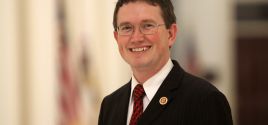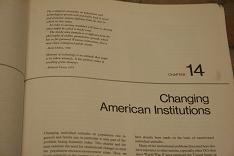Obama's Science Adviser Called for 'Zero Economic Growth'By Christopher NeefusCNS News Aug. 07, 2009 |
Popular 
Rep. Thomas Massie Warns Congress is Trying to Pass Hate Speech Laws to Outlaw Criticism of Israel

ADL Urged Congress to Pass FISA Law Spying on Americans to 'Protect Israel'

'Sniper Seen on Roof Overlooking Pro-Palestine Protest' at Indiana University

Claim Jewish Student Was 'Stabbed In The Eye' by Pro-Palestine Protester Draws Mockery After Video Released

Axios Poll: Majority of Americans Now Want Mass Deportations
  This is the real reason for the cap and trade bill. - ChrisAt a time when it was popular among environmentalists to talk about capping pollutants, John Holdren was writing about placing “caps” on the U.S. economy itself--and working toward “zero economic growth.” This is the real reason for the cap and trade bill. - ChrisAt a time when it was popular among environmentalists to talk about capping pollutants, John Holdren was writing about placing “caps” on the U.S. economy itself--and working toward “zero economic growth.”Holdren, who is now President Obama’s top adviser on science and technology policy, wrote in the 1970s that it would be “entirely logical” to cap the Gross National Product--the total productivity of the American economy. “It is by now abundantly clear that the GNP cannot grow forever. Why should it?” Holdren asked in a 1977 college science textbook he co-wrote with Paul R. Ehrlich and Anne H. Ehrlich, titled “Ecoscience: Population, Resources, Environment.” “Why should we not strive for zero economic growth (ZEG) as well as zero population growth?” The pertinent chapter, “Changing American Institutions,” discusses what the authors perceived as problems in America’s social mores, government, and economic system, which they say makes it “the leader in humanity’s reckless exploitation of Earth.” The United States, they argued, should focus on limiting the amount of physical product produced and in circulation. Again, it would be “entirely logical,” Holdren and the Ehrlichs wrote, “to set limits on the amount of product a nation needs and then strive to reduce the amount of work required to produce such a product (and, we might add, to see that the product is much more equitably distributed that it is today).” Elsewhere in the chapter, Holdren and the Ehrlichs instead highlight economies less focused on economic growth, what they call “growthmania,” where product could be better distributed. “That economists have clung to their ‘growthmania’ is not surprising,” they wrote. “After all, natural scientists often cling to outmoded ideas that have produced far less palpable benefits than the growing mixed economies of the Western world in the twentieth century.” “The question of whether a different economic system might have produced a more equitable distribution of benefits is not one that Western economists like to dwell on.” Consistent with many of the other arguments laid out in “Ecoscience,” Holdren and the Ehrlichs believe making the change to a zero growth global economy also requires curtailing Earth’s population. “How do we get from here to there? Population control, of course, is absolutely essential, with an eventual target of a smaller population than today’s.” The authors admit that making such a change to the U.S. economy would be difficult because of ingrained cultural opposition, with two chief road blocks to zero growth and broad redistribution of resources. The first problem, they say, is that it would be “a threat to some of the most dearly held beliefs of this society” and would “attack the Protestant work ethic.” That work ethic, they write, insists that one must be kept busy on the job for forty hours a week” and work overtime or moonlight, “so that the money can be earned to buy all those wonderful automobiles, detergents, appliances, and assorted gimcracks that must be bought if the economy is to continue to grow.” Holdren and the Ehrlichs, however, call that tradition “outmoded,” and say American attitudes must change to reflect their environmental situation. The larger problem, the radical enviromentalists wrote, is that forcing the economy to be less productive would face opposition from those with money and political influence. “The critical question, of course, is how to get around the extraordinary power interests that would be unalterably opposed to maximum income limits and (if possible) even more opposed to direct taxation of wealth,” they say on page 850. “Greed and the desire for power are extraordinarily strong forces against any serious attempts to curb income and wealth,” and, “(t)he real sticky wicket would be direct taxation of wealth, since that would threaten the entrenched power of the Rockefellers, Carnegies, Fords, Kennedys, and countless other beneficiaries of enterprising and acquisitive ancestors.” “But once some system of further redistribution were established in the United States, it would then be justifiable to implement a transition to a (less productive) economy as quickly as possible.” Before joining the Obama administration, Holdren was a professor at Harvard and the director of the Woods Hole Research Center in Falmouth, Mass. He holds a Ph.D. from Stanford University and an M.S. from MIT, where he also received his undergraduate degree. The White House Office of Science and Technology Policy did not comment on questions from CNSNews.com about Holdren’s stance on zero economic growth or whether it has changed since the 1970s. |



